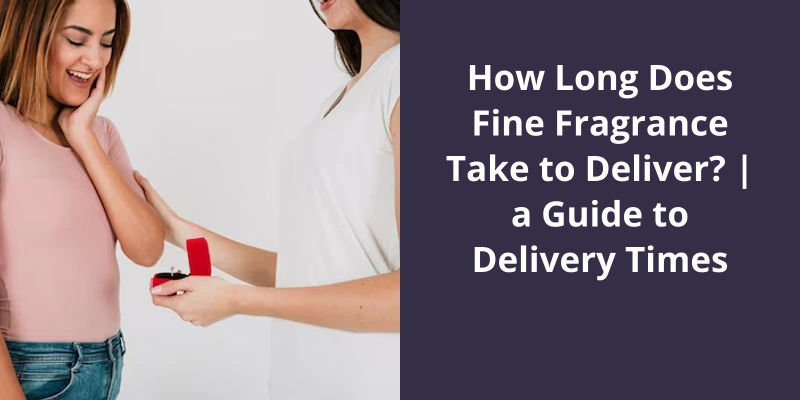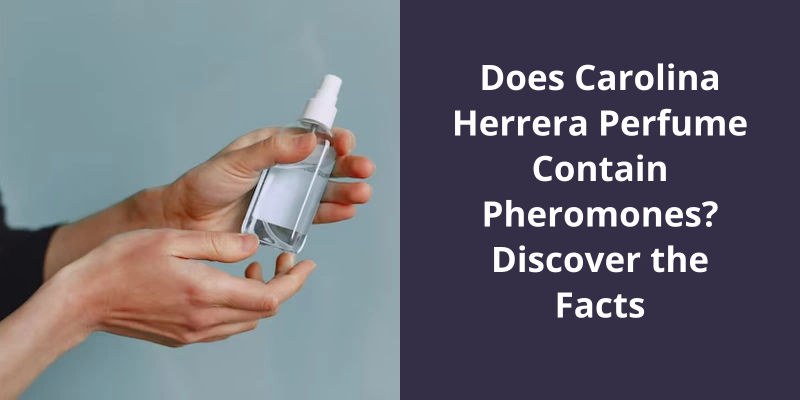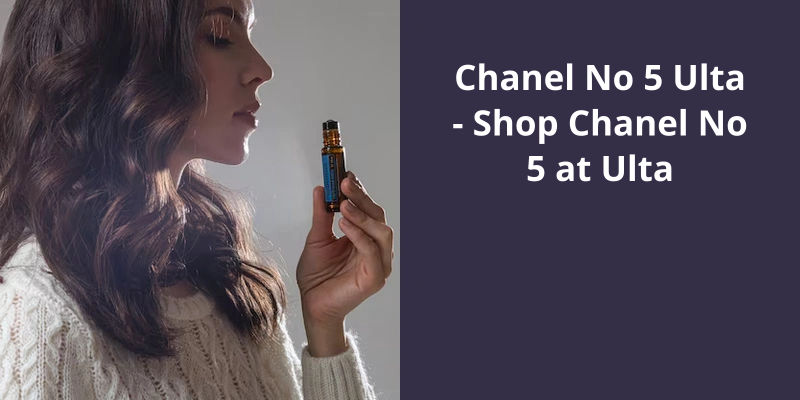The delivery time of Fine Fragrance can vary based on factors such as your location, the supplier’s location, shipping method, and the product’s availability. Typically, orders placed within the United States might take between 2 to 7 business days. International deliveries can take longer, often ranging from 7 to 14 business days. However, these are just estimates and actual delivery time could be subject to deviations. It is always a good idea to check the delivery terms offered by your specific supplier when making your purchase.

How Long Does Fine Fragrance Last?
The longevity of fine fragrance has long been a topic of debate amongst perfume enthusiasts. While some fragrances are known for their long-lasting power, others seem to fade away in no time. Factors like skin type, body chemistry, and the composition of the fragrance all play a role in determining how long a perfume lasts on your skin.
According to experts, on average, fine fragrance lasts anywhere from 4-6 hours on the skin. However, this can vary greatly depending on the type of fragrance, the notes used, and how the fragrance is applied. Some fragrances are designed to be long-lasting, using notes like musk and patchouli to create a strong base that lingers on the skin. Others are meant to be lighter and more fleeting, using citrus and floral notes to create a fresh, uplifting scent.
When it comes to fine fragrance mist, the longevity is typically shorter than traditional perfume. Fine fragrance mist has a lower concentration of essential oils compared to perfume. This means that it’s lighter and more buildable, but also has less lasting power.
Despite it’s shorter lifespan, a fine fragrance mist can still be a great way to freshen up throughout the day. Keep a bottle in your purse, stashed in your car or placed in a desk drawer for a quick spritz all day. Since the scent is lighter, you can also apply more liberally without worrying about overpowering those around you.
Applying fragrance to well-moisturized skin can help it last longer, as can layering the scent with a complementary body lotion or oil. Spraying fragrance onto clothing can also help it last longer, but be careful not to apply too much and risk staining your clothes.
Regardless, choosing a fragrance that makes you feel confident and fabulous is what matters most.
Tips for Storing Fragrance to Prolong It’s Lifespan
To store fragrance for a longer lifespan, keep it away from direct sunlight, heat, and humidity. Store it in a cool, dark, and dry place like a closet or drawer. Avoid exposing it to air for extended periods, and consider keeping it in it’s original packaging or airtight containers. Remember to keep fragrances away from sources of heat like light bulbs or radiators, as it can cause the fragrance’s composition to break down and spoil it’s smell.
As consumers, we often delight in the array of scents found in fragrances or perfumes. However, what really goes into making these fine fragrances that we so eagerly spray onto our skin or into our homes? Contrary to what some may think, the creation of a fine fragrance is highly technical and involves a precise combination of ingredients. In this article, we will delve deeper into the various components that make up a fine fragrance and how they work together to create the unique and pleasant scents that we love.
What Is Fine Fragrance Made Of?
The essential oils used in fine fragrances are extracted from flowers, herbs, spices and other natural plant materials. The fragrances used in the perfume industry are mostly extracted by steam distillation, which involves boiling the natural substances and collecting the resulting vapor in a condenser.
These aroma compounds can be synthetic or natural, and are carefully selected and blended to create a unique fragrance profile. Some of the most commonly used aroma compounds include rose, jasmine, vanilla, and musk.
Fixatives are another important component of fine fragrances. Fixatives are added to perfumes to slow down the rate of evaporation of the fragrances, allowing the scent to last longer. Common fixatives include resins, ambergris, and musk.
Solvents are used in the production of fine fragrances to dissolve the other ingredients and create a stable and even scent. Alcohol is the most commonly used solvent in the perfume industry, and is used in varying percentages to create different strengths of fragrances. Other solvents include glycerin and propylene glycol.
The process of creating a fine fragrance is both an art and a science. Perfumers use their knowledge of chemistry, aroma compounds, and natural ingredients to create unique and complex fragrance profiles. The end result is a beautiful scent that can transport the wearer to another place or time, and create an unforgettable olfactory experience.
The History of Fine Fragrances and Their Cultural Significance.
This article provides a brief overview of the history of fine fragrances as well as their cultural significance. It examines how fragrances have been used for centuries to signify status, wealth, and aesthetic tastes across various cultures and civilizations. The article also explores how modern perfumery evolved from the traditional art of perfumery, and how fragrances continue to play an important role in our lives today.
Source: What Is A Fine Fragrance – Kreative Fragrance
While it’s tempting to go for a cheaper fragrance option, you may be disappointed with how quickly it fades away. The reason behind this is simple – cheap perfumes are diluted and less complex, resulting in a shorter lifespan. In this article, we’ll delve deeper into why this happens and what you can do to make your cheap perfume last longer.
Why Do Cheap Perfumes Not Last Long?
The cheaper perfumes tend to use synthetic fragrances, which aren’t as long-lasting as natural ingredients. Synthetic ingredients are often less expensive for the manufacturers to use, so they’re included to keep the cost of production down, resulting in lower-priced perfumes for consumers. However, these synthetic ingredients tend to evaporate much faster, leading to the scent fading away quickly.
High-end perfumes are usually aged for months or even years to allow the fragrance oils to blend and mature. This process enables a fragrance to settle and become more complex, resulting in a longer-lasting scent.
It’s essential to keep in mind that cheap perfumes are designed to be affordable and accessible to the general population, so their price point will reflect the quality of the product. Therefore, it isn’t realistic to expect a lower-priced perfume to match the longevity and complexity of a high-end fragrance. However, with good care, such as storing the perfume in a cool, dark place and avoiding exposure to direct sunlight, one can get the most out of a budget-friendly perfume.
However, there are still great options to choose from if looking for an affordable perfume. Proper care and maintenance will enable the scent to last for a more extended period.
The Difference Between Synthetic and Natural Fragrances in Perfumes
Synthetic fragrances are man-made chemical compounds created in a lab, while natural fragrances are extracted from plant sources such as flowers, herbs, and fruits. Natural fragrances are seen as more environmentally friendly and less likely to cause allergic reactions, while synthetic fragrances can offer more consistent and longer-lasting scents. Some perfumes use a combination of both types of fragrances.
As with any new hobby, starting a fragrance collection can seem overwhelming at first. However, with the guidance of fragrance experts, building a versatile collection can be a rewarding experience. By following your nose, identifying perfume families, starting slow, and experimenting with layering scents, you can create a collection that reflects your personal taste and style. Read on to discover the step-by-step process towards a well-rounded fragrance collection.
How Do I Start Collecting Fragrances?
If youre interested in fragrances and want to start collecting them, the first rule is to follow your nose. It’s important to trust your instincts when it comes to identifying scents that appeal to you. Take some time to explore different fragrances and develop a sense of what you like in terms of scent families, notes, and intensity.
Once you’ve a better sense of your fragrance preferences, it’s helpful to identify your perfume families. This means categorizing different fragrances based on their notes and characteristics. Some common perfume families include Floral, Oriental, Woody, and Fresh. By identifying your preferred scent families, you can start building a more versatile collection that includes a range of scents to match your mood and occasion.
When starting your fragrance collection, it’s important to start slow and steady. Rather than trying to amass a huge collection all at once, start with a few high-quality fragrances that you really love. This will allow you to get a better sense of each fragrance and how it interacts with your body chemistry.
To get even more out of your fragrance collection, try layering your scents. This means using multiple fragrances at once to create a unique scent thats tailored to your preferences. This can be as simple as combining a floral scent with a woody scent, or experimenting with more complex combinations to create a unique fragrance profile.
Above all, it’s important to experiment and expand your fragrance collection over time.
How to Properly Store Fragrances to Maintain Their Quality
To maintain the quality of fragrances, it’s important to store them properly. This can be done by keeping them away from direct sunlight, heat, and humidity. A cool, dry place like a closet or cabinet is ideal. It’s also best to store them in their original packaging or in a dark, glass container. Avoid exposing fragrances to air for prolonged periods of time, as this can cause them to oxidize and lose their potency.
As fragrance enthusiasts may know, there’s a distinction between fine fragrance and perfume. Fine fragrance is typically associated with luxury brands and is crafted with the sole purpose of smelling good, whereas perfume may serve a functional purpose beyond just being a pleasant scent. To better understand the difference between the two, let’s take a closer look at their distinct qualities and characteristics.
What Is the Difference Between Fine Fragrance and Perfume?
Fine fragrances are designed to evoke emotions and create an aura of luxury around the wearer. Their formulas can include rare and expensive ingredients, carefully blended by master perfumers to create a singular scent that reflects the personality and style of the wearer. These fragrances are typically sold in higher-end department stores and boutiques, and are marketed as the ultimate luxury accessory.
Perfumes, on the other hand, are broadly defined as any fragrant liquid or solid made from a blend of aromatic compounds. This includes not only fine fragrances, but also functional perfumes such as those used in cleaning products, body sprays, and air fresheners.
One way to understand the difference between fine fragrance and perfume is to think of the former as an art form and the latter as a science. Perfumery, on the other hand, is a more analytical field that seeks to understand the chemical properties of scent and how it can be manipulated to produce specific effects.
Whether youre after a high-end scent that will turn heads wherever you go, or a functional perfume that will help you relax or stay focused, theres something out there for everyone. The key is to choose a fragrance that speaks to you personally and that reflects your unique sense of style and personality.
The History and Evolution of Fragrances and Perfumes
- Egyptian and Mesopotamian civilizations created the first fragrances using essential oils and other ingredients.
- Greeks and Romans continued the use of fragrances for religious purposes and personal grooming.
- Islamic civilizations developed distillation techniques to create more concentrated perfumes.
- The Renaissance era saw the rise of personal fragrances as a fashion statement among aristocrats.
- The Industrial Revolution led to the mass production of perfumes and the creation of synthetic fragrances.
- The 20th century saw the growth of the fragrance industry with new scents and marketing techniques.
- Today, fragrances and perfumes are a multibillion-dollar industry with thousands of brands and scents available worldwide.
If you’ve any questions or concerns about finding the perfect fine fragrance for your needs, don’t hesitate to reach out to us. Our team is available to assist you in any way we can, providing expert guidance and advice to ensure you find the ideal fragrance for your unique preferences. Whether you prefer to email, call, or visit our contact page, we’re always here to help. Read on to learn more about the world of fine fragrances and discover what makes them so special.
How Do I Contact Fine Fragrance?
When it comes to sourcing fine fragrances, you want to ensure that you’re working with a reputable company that can provide you with high-quality products. This is where Parento Ltd. comes in – we’ve years of experience in the fragrance industry and are renowned for creating exquisite fragrances that are both refined and unique.
If you’re interested in working with us to create a fragrance that truly captures your brand, we encourage you to get in touch with us. One of our representatives would be happy to discuss your project with you and help you determine the best approach for achieving your goals.
At Parento Ltd., we pride ourselves on our ability to create scents that evoke emotion and capture the essence of a brand. Whether you’re looking for a signature scent for your business or a fragrance that embodies a specific mood or feeling, we’ve the experience and expertise to deliver.
We’re excited to speak with you and to help you discover the possibilities of fine fragrance.
Examples of Successful Fragrance Collaborations Between Companies and Parento Ltd.
In recent years, Parento Ltd. has partnered with various companies to create successful fragrance collaborations. These partnerships have resulted in innovative and unique scents that have been well-received by consumers.
Conclusion
However, for the specific query on the delivery time of an order, it takes approximately 10 working days to receive it. This timeline may change based on circumstances such as holidays or unforeseen circumstances, but generally, customers can expect to receive their order within a reasonable timeframe. It's important to note that various retailers may have different delivery policies and timelines, so it's always advisable to check with them beforehand. Overall, the wait time for fine fragrance delivery is a small price to pay for the luxury and elegance that comes with a high-quality fragrance.





